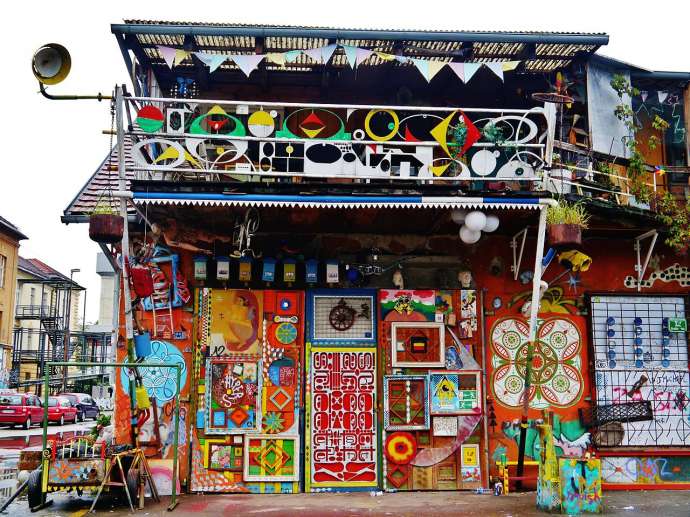STA, 21 October 2020 - More than a dozen independent producers and non-governmental organisations face the threat of eviction from the state-owned premises in a former military compound in Metelkova Street in Ljubljana that witnessed some of the landmark events leading to Slovenia's independence.
Some of the NGOs that have their premises in the building received an appeal from the Culture Ministry on Monday that they move out by the end of January 2021 or face a court-imposed eviction.
The ministry says the building is in a bad state of disrepair and is slated for renovation, but the NGOs say that budget funds for the planned renovation are not planned until 2023 and are refusing to leave.
The NGOs say the ministry has not offered them substitute premises or engaged in dialogue with them, which is why they understand the move as an "attack on civil society and independent culture in the desire to prevent the activity of a critical public".
The building is home to several internationally renowned independent producers and organisations active in cultural and artistic production, research and advocacy of minority and marginalised groups, including the Peace Institute, Zavod Maska, Škuc, the producers of City of Women and Kino Otok film festival, dance company PTL, and the arts collective NSK.
In a press release on Tuesday, the organisations noted that their work can be traced back to the legacy of the movements that "in the 1980s promoted the society's democratisation and demilitarisation, thus decisively contributing to the adoption of a democratic constitution after independence".
The compound was where Janez Janša, the incumbent prime minister, was detained by the Yugoslav army in 1988 before being put on trial by the military for allegedly divulging a military secret in a newspaper article, along with three other defendants in what is known as the JBTZ process.
The quartet's arrest and subsequent trial triggered massive protests and acted as a catalyst for Slovenia's democratisation and independence.
One of the key symbolic events in the efforts for democratisation and demilitarisation as pointed out by the NGOs was in 1993 when culture workers, artists and activists occupied what used to be the Yugoslav army's Ljubljana headquarters.
"Ever since it has constituted a public space where we respect diversity, solidarity, dialogue and critical thought. Those values and historical facts are what the current government seeks to erase, even though the prime minister used to count himself among pacifists," the NGOs say.
They say the building in Metelkova 6 is the only one that the Culture Ministry has allocated to independent cultural, artistic and research organisations working in the interests of the public, but that the ministry chose to "withdraw our basic infrastructure amid the pandemic".
The building is the only part of the south section of the Metelkova compound that is yet to be renovated. Owned by the Culture Ministry, the section is home to three museums and several other cultural institutions.
The north section of the compound, known as AKC Metelkova Mesto, has developed into an alternative culture hub after being squatted by artists in the early 1990s as the city authorities, which assumed ownership of that part of Metelkova, started pulling down the buildings. The former military prison has been turned into a hostel called Celica.
The NGOs insist that they will "not leave the building and will stand up full force against attacks on the civil society, independent culture and democracy".
In response for the STA, the Culture Ministry said the building concerned was unsafe to reside in: "The main structure is undermined, the roof is leaking, part of the roofing has fallen off and damaged a car in the parking lot."
The ministry noted that the building, which is not earthquake safe, had been planned for urgent renovation under the previous government, and to avoid any risk it urged the 18 users to move out so the building could be refurbished.
The ministry said that none of the users of the building have been paying rent and that some have not even paid for their running expenses.
The NGOs facing eviction have been backed by the centre-left opposition, in particular the Left, and an online petition signed by more than 2,300 people, which accuses the government of "trying to destroy the cultural sector, and in particular NGOs".







